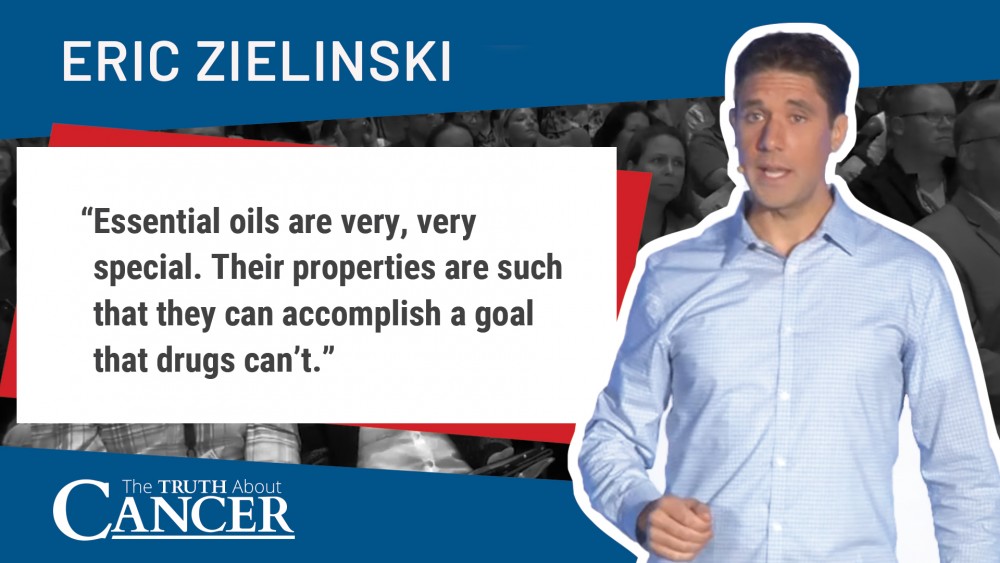Video Transcript: Essential Oils: What Are They & How Are They Used?
Ty Bollinger: Essential oils have such a long list of health benefits. And the best part is that you can find an oil for your specific health needs. Some of you may prefer to liven up dishes with them or maybe you prefer the gentle, aromatic effects of a massage.
Charlene Bollinger: Whichever way you decide to use essential oils, it’s best to know exactly what they are and how they can be applied. Join our good friend, Eric Zielinski who will carefully break down everything for you so that you can know more about essential oils.
Dr. Eric Zielinski: So what are essential oils? Essential oils are volatile organic compounds. What does that mean? They evaporate. So, when you steam distill a plant matter, whether it’s a resin, whether it’s a root, whether it’s a blossom whether it’s a—whatever it might be, tree bark, you distill these plant matters and what happens is, through a beautiful biochemistry reaction, you have these volatile organic compounds that emit through the steam distiller. They, once they’re condensed with a cooling water tube, you get to extract them. And they’re not greasy. They’re called oil, but they’re not an oil actually, and they’re not essential, which is interesting.
It’s a misnomer. They’re not essential. I mean, can I geek out a little science? I’m not really the biggest science guy here, some people just wow my brain. But they’re secondary metabolites of photosynthesis. What does that mean? The primary metabolite. Who knows? What’s a primary metabolite of photosynthesis? Glucose. We need glucose or we die. That’s what plants use, that’s what people, animals, we need. So, photosynthesis, the whole point of photosynthesis is to create glucose.
The secondary product—a lot of things including essential oils. They are chemicals, they’re alcohols, esters, ketones, things that have no nutrition in them, no vitamins, no minerals, nothing, okay?
But they are fat-loving and they’re water-hating, that’s what we call them oil. Comparatively, these are your fixed oils, your coconut oil, your almond oil, your grapeseed oil, they’re completely different, they’re nonvolatile meaning they don’t evaporate, they’re very greasy, they’re expressed, or they’re solvent-extracted, which are just a—again it’s in the book. Don’t worry about it, I got it, I cover all this stuff, this aromatherapy stuff. And it contains fatty acids.
So why is this important? Because essential oils are very, very special. Their properties can do things—their properties are such that they can accomplish a goal that drugs can’t. For example, it’s virtually impossible for most drugs, especially chemotherapy, to enter the blood-brain barrier, right? We all know that.
Well sesquiterpenes, which is a chemical in many essential oils like frankincense—who’s ever heard of frankincense? Why have we heard of frankincense? Well yes, the Jesus story, frankincense, gold, and myrrh.
But we’ve heard of it because so many people, especially if you’ve listened to the The Truth About Cancer: A Global Quest, you’ve heard Allison Huish’s talk, a friend of ours, on how she uses frankincense essential oil to cure herself of a brain tumor. They literally pass the blood-brain barrier; they are so small. The daltons, again for those chemistry nerds out there, they’re so light that they have the ability to go right into the cell, no facilitated diffusion, they go right into the cell. That’s very special, because what they found, and I’ve got to be careful, especially for people that are live streaming, I don’t want anyone to misconstrue me, especially my aromatherapy colleagues, I am an aromatherapist.
This is not an all or nothing thing. I’m not dichotomizing chemo and oils; not at all. I’m a very much integrative kind of person. Research has actually proven and shown that essential oils help chemo be more effective, and if you have an oncologist worth his or her weight in gold or salt, they will tell you they won’t interact. You can use your essential oils and your chemo and your radiation, alright?
So, I’m not here to judge, and I’ve got to say we have badges of honor here. Again me, “I’ve been on antibiotics one time in the last 10 years, right? Yeah look at me.” We brag about this. And then guess what happens to the person next to me who just took an Advil? They feel ashamed. That’s not the point of this. You know what I’m talking about. You really know what I’m talking about. If you’re on chemo, if you’re undergoing radiation, well, let’s help your body react to it in a positive way.
That’s where essential oils come into play. They help with side effects like nothing else on the planet.
Charlene Bollinger: We hope you learned a lot from this video. If you learned something new, please take a few seconds to let us know in the comment section below.


















I am very much interested in learning more about how to use oils for better health benefits.
Hi Lisa,
Thanks for tuning in to this video about essential oils! Here are some great articles that may be of interest for you:
https://thetruthaboutcancer.com/diffusing-essential-oils/
https://thetruthaboutcancer.com/carrier-oils-for-essential-oils/
https://thetruthaboutcancer.com/ingesting-essential-oils/
https://thetruthaboutcancer.com/cancer-fighting-essential-oils/
I truly appreciate the work you are doing. Thank you. I have benefited myself and try, without being obnoxious, to at least mention your efforts to others, thus availing them of the opportunity to reach out.
I had a mastectomy when I was 82, I also have Diabetes,and poor vision. How do you use these oils please?
I have been using essential oils for a couple of years. I appreciate the affirmation that he shared.
Many cancer patients use essential oils to try and fight cancer.